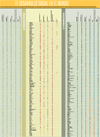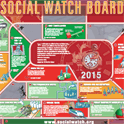Social Watch News
|
Published on Thu, 2010-07-22 13:10
THE MILLENNIUM DEVELOPMENT GOALS: Eradicate extreme poverty and hunger • Achieve universal primary education • Promote gender equality and empower women • Reduce child mortality • Improve maternal health • Combat HIV/AIDS, malaria and other diseases • Ensure environmental sustainability • Halve the proportion of people whose income is less than one dollar a day • Halve the proportion of people who suffer from hunger • Eliminate gender disparity in education • To halt and reverse the spread of HIV/AIDS, the incidence of malaria and other major diseases • To reduce maternal mortality • Halve the proportion of people without access to safe drinking water • Make available the benefits of new technologies, especially information and communications » |
|
Source: . Published on Thu, 2010-07-22 00:00
» |
|
Source: . Published on Wed, 2010-07-21 00:00
» |
|
Published on Tue, 2010-07-20 13:13
» |
|
Source: . Published on Tue, 2010-07-20 00:00
» |
|
Published on Mon, 2010-07-19 13:28
HOW TO PLAY: |
|
Source: . Published on Mon, 2010-07-19 00:00
» |
|
Source: . Published on Sun, 2010-07-18 00:00
|
|
Source: . Published on Sat, 2010-07-17 00:00
» |
Published on Fri, 2010-07-16 12:24
 When will dignity for all be achieved? What is the bare minimum required for a decent life for all? The world leaders who signed the Declaration did not define it clearly, but its principles are embedded in the commitment to achieve certain targets by 2015. Some of these goals are set “for all” (100% basic education, 100% access to water and sanitation), while others aspire, for example, to “reduce by half the proportion of people who suffer from hunger”. Such a reduction would be a major achievement… but still leave the other half hungry. When will we achieve the basic standards of material dignity for all the world’s people? Not in a hundred years unless we substantially accelerate the current trends of progress in the social areas! |
SUSCRIBE TO OUR NEWSLETTER











